These Gut Healthy Recipes are made in up to 30 minutes and may potentially improve digestion and sleep, aid with weight loss, increase energy, and clear skin. As a bonus, get the list of the best foods for gut health to add to your diet!
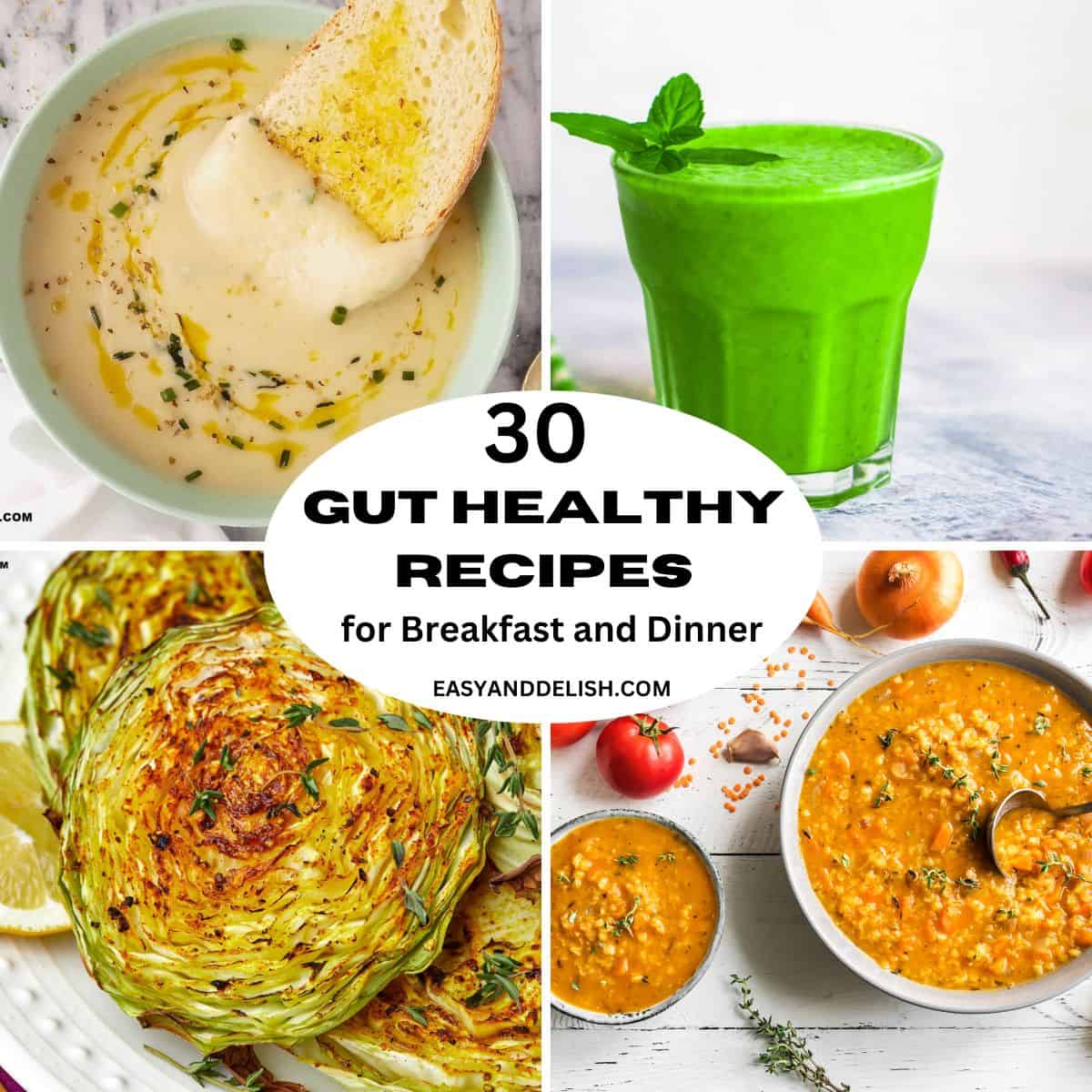
Table of Contents
Why is Gut Health Important?
The gut, commonly known as the digestive tract, is a complex system that goes from the mouth to the anus, processing and breaking down food into nutrients. According to Parkview Health, gut health is important because it aids in the digestion of the foods we eat and the absorption of nutrients. Moreover, it can also reduce inflammation that can lead to heart disease, lower the chance of obesity, and improve energy, as per Franciscan Health.
WATCH ME MAKING ONE OF OUR GUT-HEALTHY RECIPES!
What Makes a Healthy Gut?
According to Everlywell, a healthy gut means that there are more good bacteria than harmful bacteria. It lists 7 signs of a healthy gut: Regular bowel movements, consistent energy, normal amount of gas and bloating, healthy bowel transit time, mental clarity, healthy reactions to food and stress, and no adverse reactions to food. Fiber plays a role in a healthy gut.
Which Foods Are Gut Healthy?
A healthy gut is the foundation of overall well-being, and certain food categories (prebiotic and probiotic foods) are particularly good for you. Our gut-healthy recipes contain these foods! According to Nourish, these are the best foods for gut health (and weight loss):
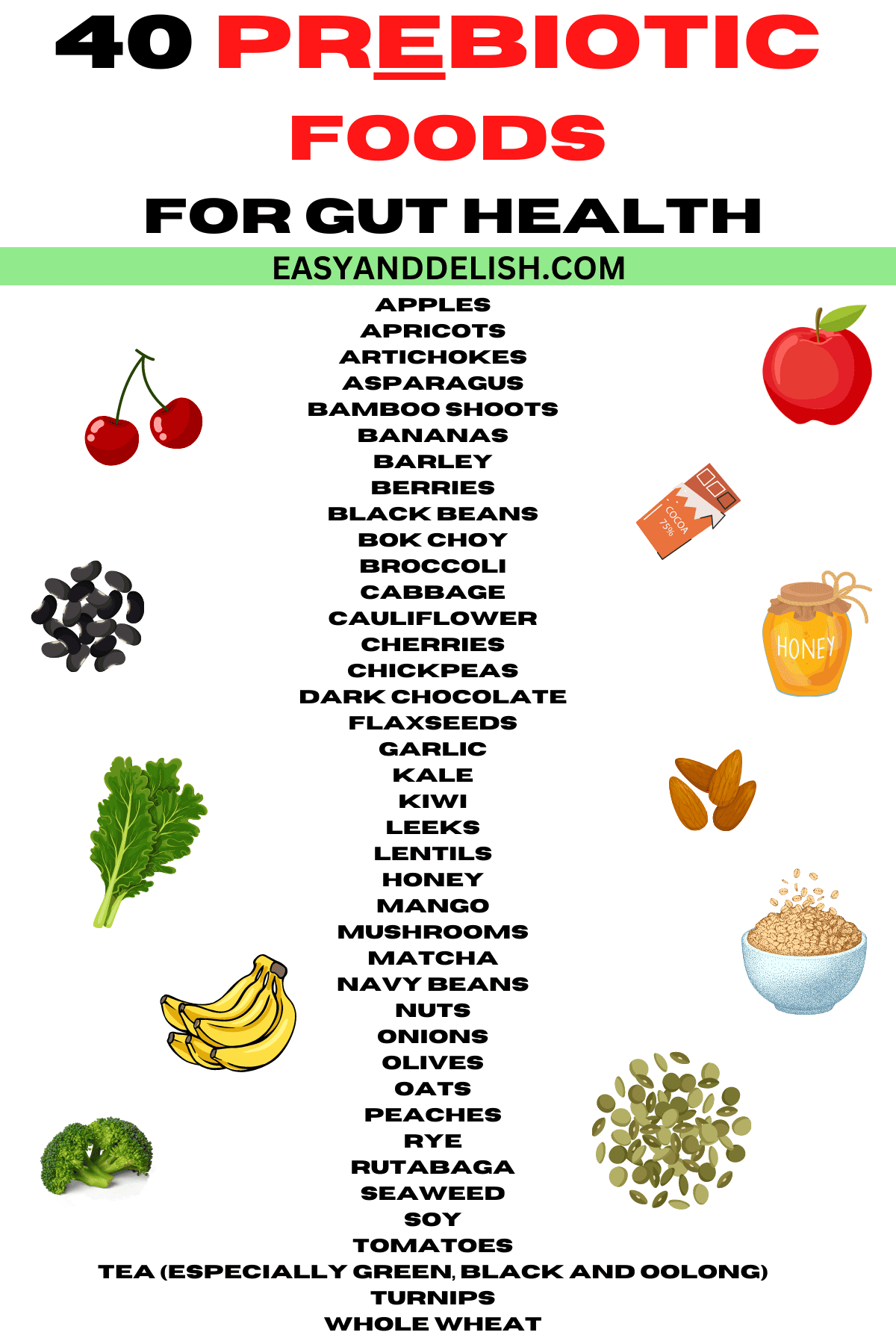
- Whole grains: Options such as barley, quinoa, and oats not only aid in digestion but are also packed with fibers that beneficial gut bacteria thrive on.
- Fruits and vegetables: These are loaded with essential nutrients, antioxidants, and fibers. Not only do they benefit overall health, but they also provide prebiotics that fuel good gut bacteria.
- Leafy greens: Greens such as spinach, kale, and chard are rich in essential vitamins, minerals, and fibers that support a healthy gut lining and promote bacterial diversity.
- Fermented foods: These foods undergo a process where natural bacteria feed on the sugar and starch, producing lactic acid. This process not only preserves the foods but also creates beneficial enzymes, vitamins, and probiotics. Examples include yogurt, kefir, raw sauerkraut, miso, tempeh, and kimchi.
- Anti-inflammatory recipes such as this anti-inflammatory smoothie recipe.
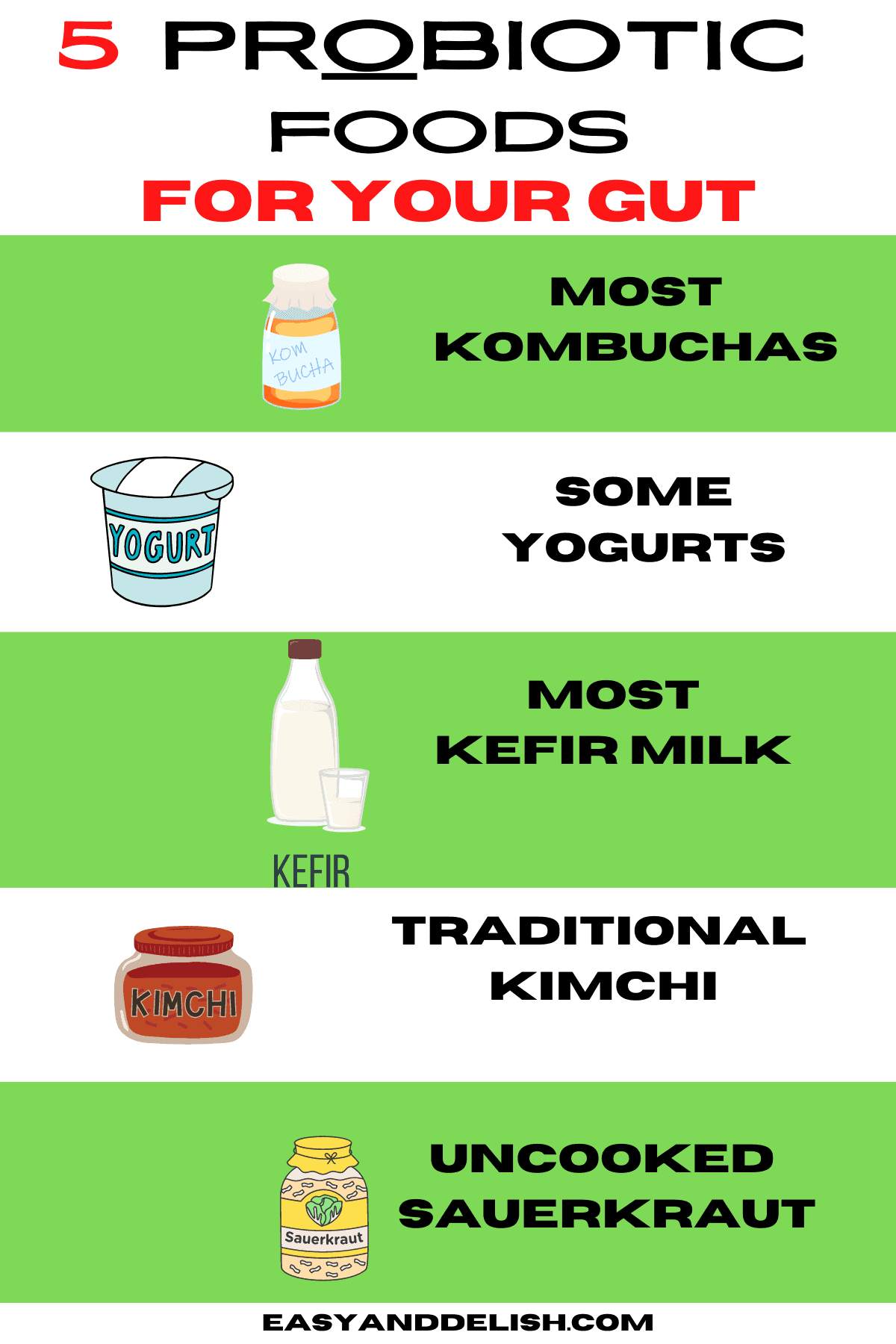
What Foods Are Worst for Gut Health?
While many foods may benefit the gut, others can potentially harm its delicate balance. Here is a list of foods to stay away from according to MedicineNet:
- Processed foods
- Artificial sweeteners
- Artificial additives (such as food coloring)
- Excess alcohol
- Salt, when consumed in excess
- Red meat (high in saturated fat)
- MSG
- Dairy (due to inflammation)
- Gluten, if consumed in excess
Gut Healthy Recipes
We listed our gut-healthy meals in 2 categories: Prebiotics and Probiotics.
Prebiotics
Prebiotics are mostly carbohydrates that contain nutrients that stimulate the growth and activity of certain microorganisms in the gut. Most are gut-healthy dinner recipes while others are snack and breakfast recipes for gut health. Our healthy gut recipes below contain one or more prebiotic foods:
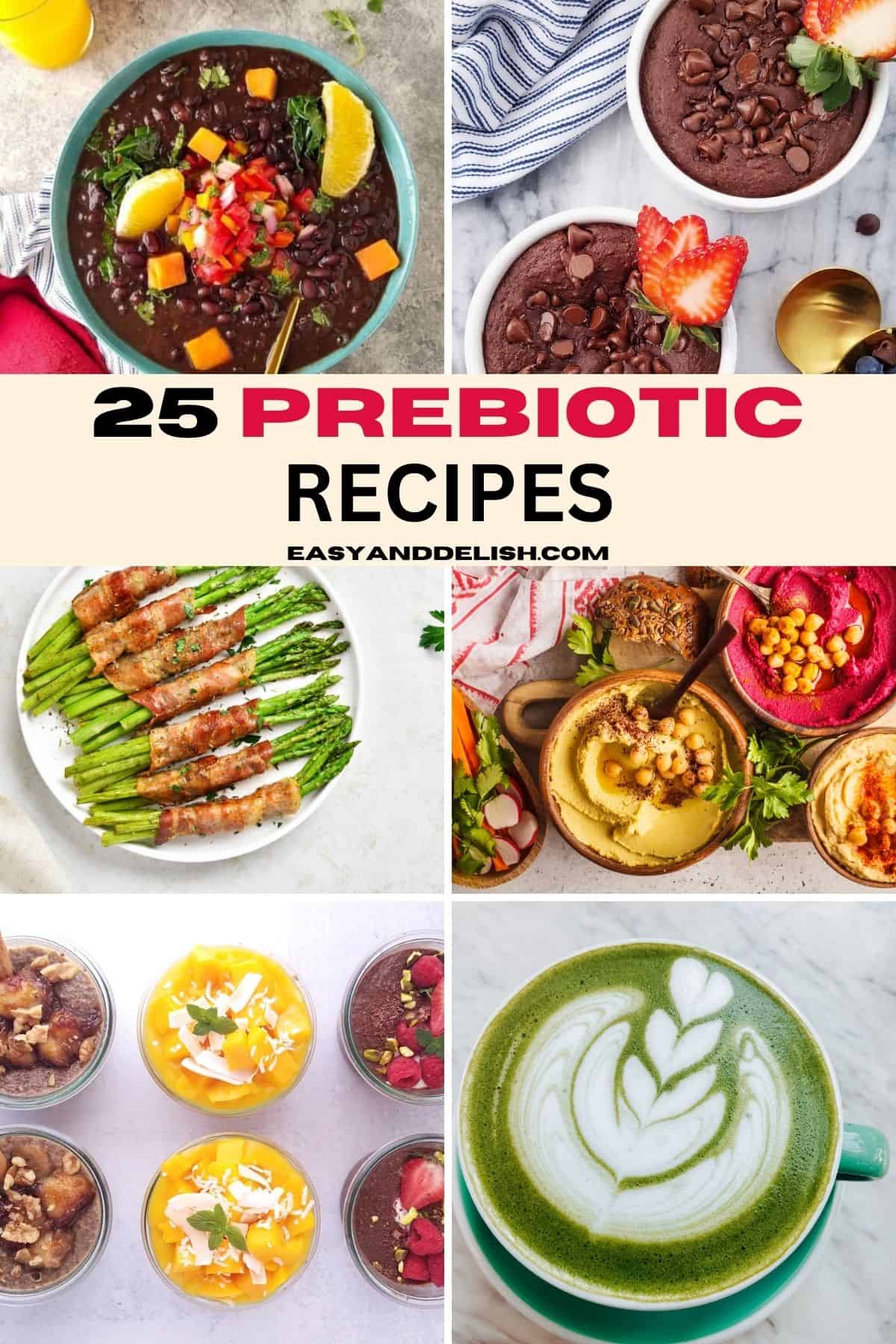
- Instant Pot Black Bean Recipe
- Lentil Soup Recipe
- Overnight Oats
- Baked Oats
- Gluten-Free Oatmeal Chocolate Chip Cookies
- Meal Prep Chia Pudding
- Homemade Energy Bar Recipe
- Oatmeal Porridge
- Keto Hummus Recipe
- Weight Loss Cabbage Soup
- Green Smoothie Recipe
- Cauliflower Soup Recipe
- Chocolate Chia Pudding
- Banana Chia Pudding
- Mango Coconut Chia Pudding
- Air Fryer Asparagus
- Cabbage Steaks
- Cucumber Chickpea Salad
- Mushroom Steak
- Cauliflower Steak
- Instant Pot Potato Leek Soup
- Air Fryer Broccolini
- Almond Milk Matcha Latte
- Instant Pot Lentils
- Vegetarian Feijoada
Probiotics
Probiotics are mainly fermented foods that contain live beneficial bacteria. The gut-friendly recipes below contain each type of fermented food that is good for gut health:
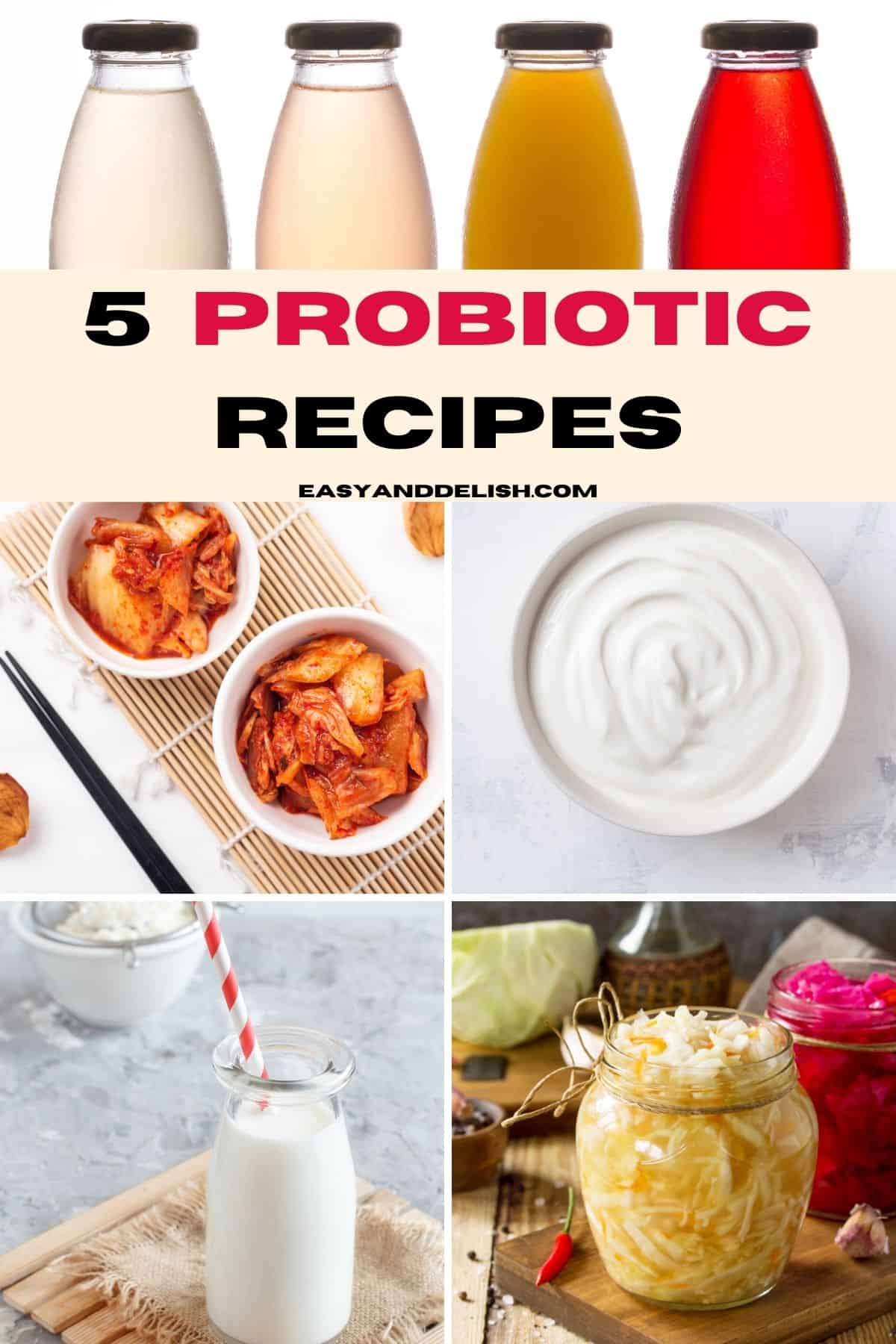
FAQs
According to Henry Ford Health and other medical sources, there are several simple ways to improve gut health: Consume fiber and fermented foods, keep hydrated, avoid processed foods, sleep at least 7 hours daily, reduce stress, and exercise.
Hackensack Meridian Health has rated the Mediterranean diet as the best diet for gut health. It is “ high in fiber and encourages eating a variety of nutrient-dense foods”, reshaping gut microbiota.
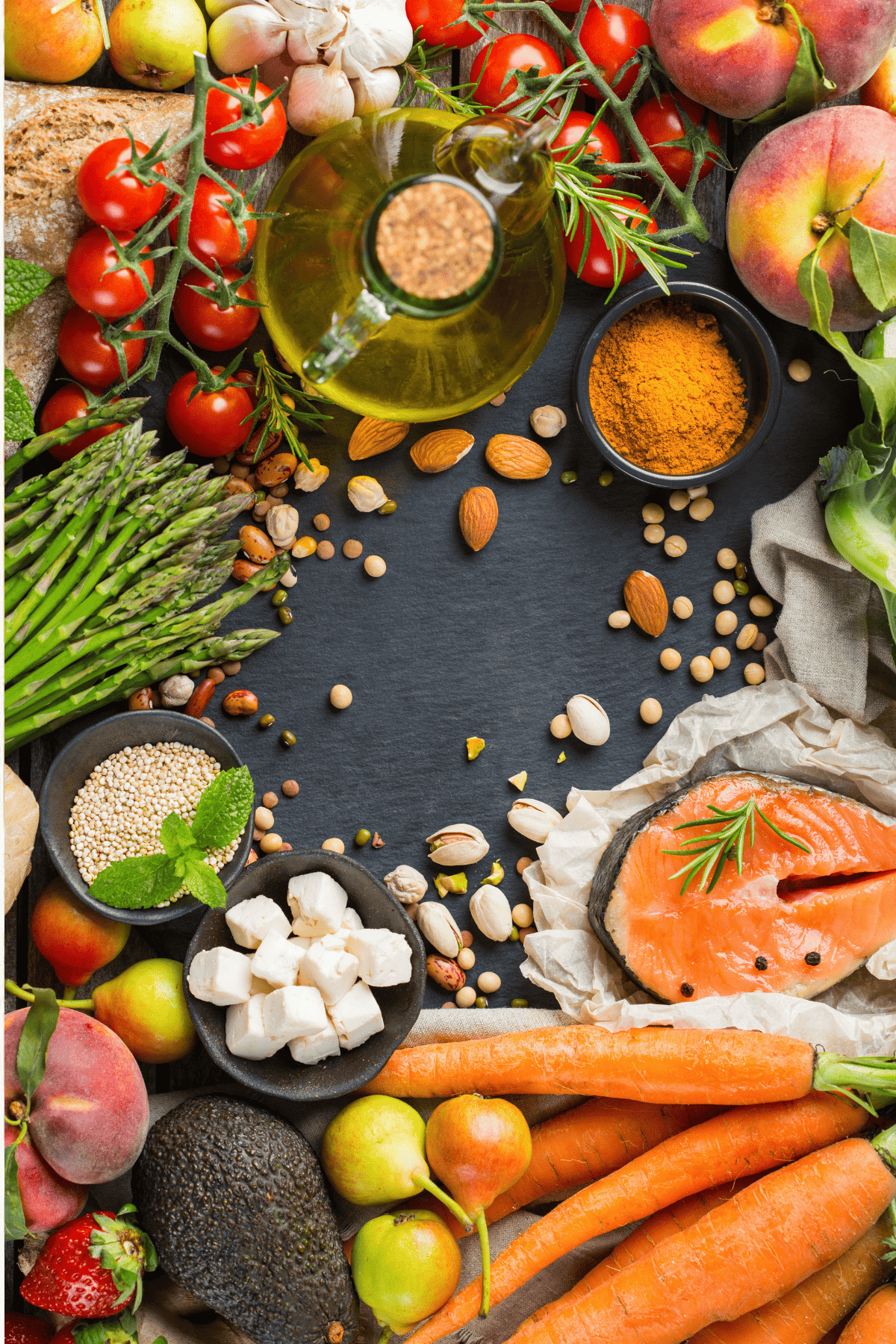
More Healthy Recipe Round-Ups
In addition to our gut-healing recipes, try these healthy recipes below:
- 30 High-Fiber Recipes
- 30 High-Protein Dinners
- 21 High-Protein Meal Preps for Lunch
- 50 Easy Healthy Crockpot Meals for Dinner
- PCOS Food List
- 30 Easy Gluten-Free Dinners
- 80 Low-Calorie Dinners
- 30 Low-Carb Dinner Recipes
PIN AND ENJOY!
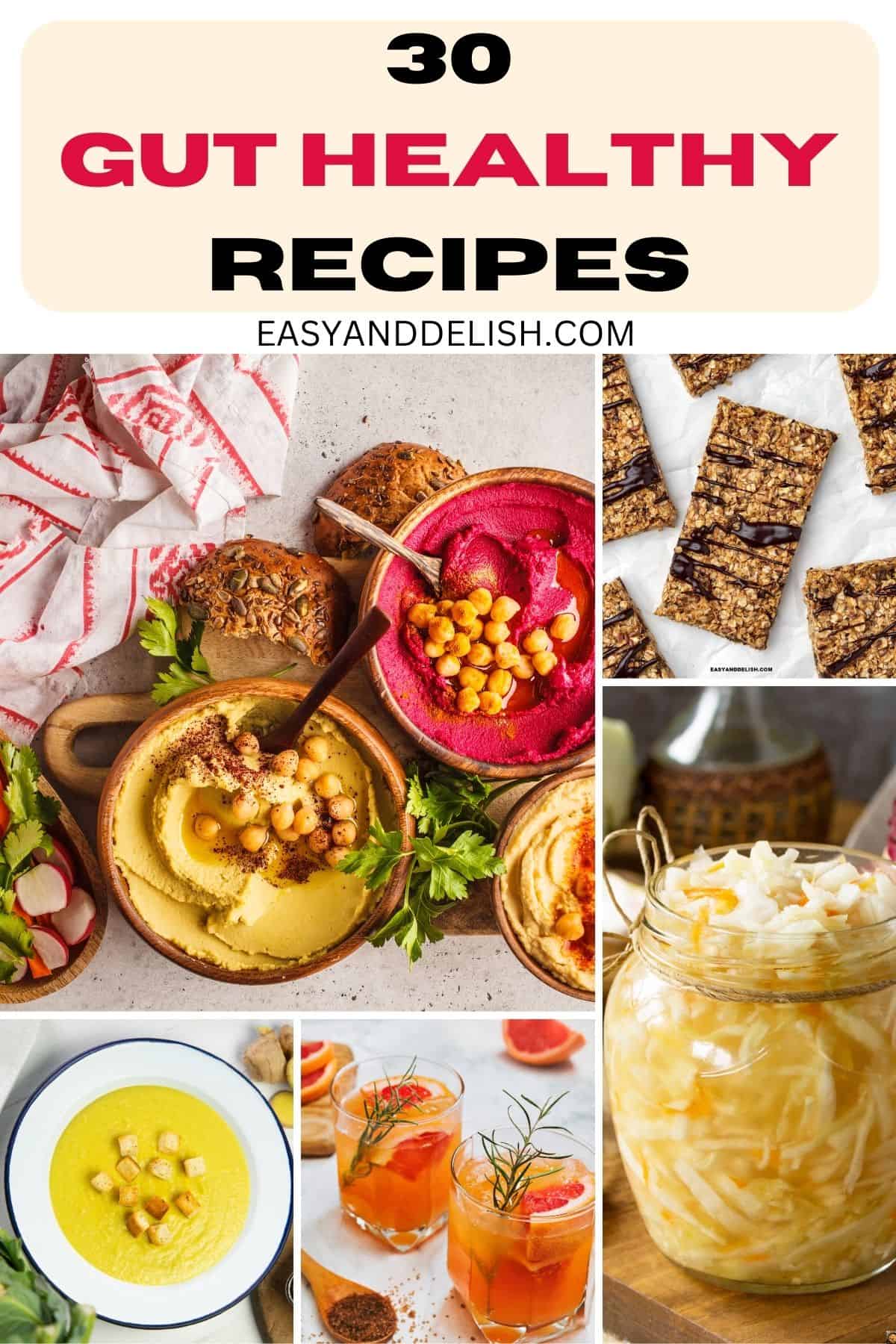
30 Gut Healthy Recipes
Equipment
- baking sheet
- brush
Ingredients
- 2 lbs fresh asparagus no need to peel them
- 1 tablespoon olive oil
- 1 tablespoon garlic powder
- ¼ teaspoon salt or more depending on how salty your Parmesan cheese is
- ¼ cup grated Parmesan cheese plus extra to serve with
- Freshly ground black pepper
- ½ lemon or more if desired
- red pepper flakes to taste (OPTIONAL)
Instructions
- Wash under cold water, pat them dry with a paper towel, and trim the tough woody ends of the asparagus spears. Place them onto a baking sheet in a single layer and brush them all over with olive oil.
- Season them with a mixture of garlic powder and salt. Then sprinkle parmesan cheese and the freshly ground pepper on top!
- Spray your air fryer basket with no-stick spray or brush on some olive oil. Line up the seasoned asparagus in a single layer inside your air fryer. If yours is small like mine, you may have to cook them in 2 batches.
- Air fry asparagus at 380° F (190° C) for about 7 minutes or until tender and golden brown. No need to preheat the air fryer in order to prepare crispy asparagus!
- Before serving, squeeze lemon juice on top and serve with lemon wedges and more Parmesan cheese (and red pepper flakes, if desired).
Recipe Video
Recipe Notes
- FRIDGE: Store leftovers in an airtight container or freezer plastic bag for about 2-3 days. Reheat in the microwave (about 60 seconds) or in a preheated air fryer at 350 degrees F (3-5 minutes) or just until hot.
- FREEZER: This is one of those easy freezer meals that you can freeze for about 1 month and thaw them in the fridge overnight. But be aware they won’t be as firm and have some crunch as when they were cooked.
- TEXTURE/APPEARANCE: Crisp asparagus must be plump and firm, and tips should be tightly closed.
- COLOR: They should be green, purple, or white, depending on the variety. Just make sure the color is not faded!
- ODOR: Make sure they don’t smell spoiled!
- Before cooking these easy air fryer asparagus, rinse them under cool running water and then pat them dry well with a paper towel.
- If you prefer, peel the spears with a vegetable peeler, although it is not necessary!
- Snap off the bottom of one stalk! It will naturally break just about where the woody part ends and the tender part begins. Next, line up that spear close to a pile of other spears, and cut off the tough, woody ends using a sharp chef’s knife.
- Toss the ends and season your spears!
Nutrition
** Nutrition labels on easyanddelish.com are for educational purposes only. This info is provided as a courtesy and is only an estimate, since the nutrition content of recipes can vary based on ingredient brand or source, portion sizes, recipe changes/variations, and other factors. We suggest making your own calculations using your preferred calculator, based on which ingredients you use, or consulting with a registered dietitian to determine nutritional values more precisely.
Please note that health-focused and diet information provided on easyanddelish.com is for educational purposes and does not constitute medical advice, nor is it intended to diagnose, treat, cure, or prevent disease. Consult with your doctor or other qualified health professional prior to initiating any significant change in your diet or exercise regimen, or for any other issue necessitating medical advice.
This post was first published on August 28, 2023.




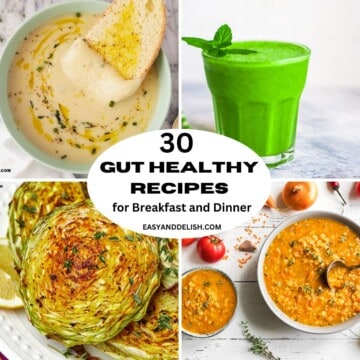

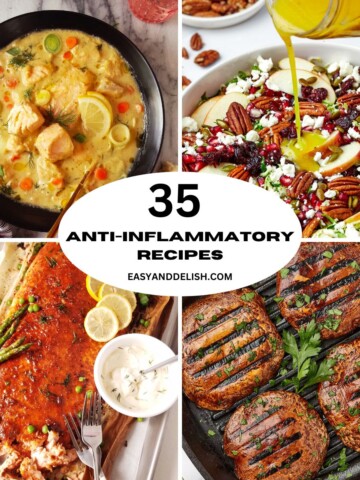


Leave a Reply